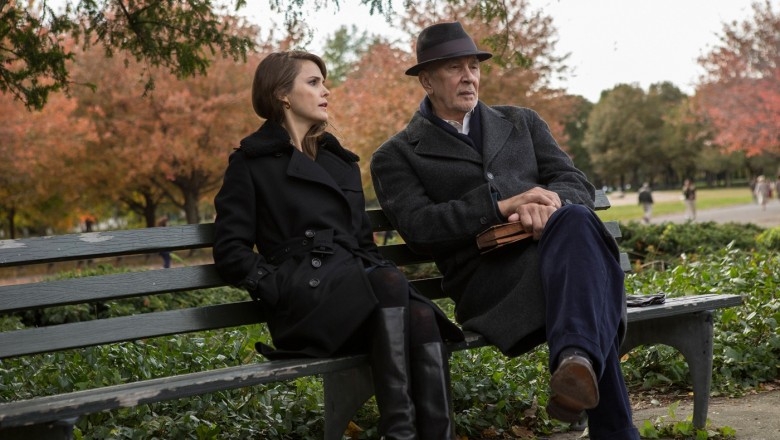Here’s Lynn Lee, with a closer look at the newcomer and underdog of the six Emmy nominees for Best Lead Actress in a drama:

When I first started watching The Americans, I was blown away by one actor, and one actor alone: Matthew Rhys, as the male half of a pair of KGB operatives hiding in plain sight in the suburbs of Reagan-era Washington, D.C. Oh, the rest of the cast was strong, too, but Rhys—whom I’d never previously seen in anything—left everyone else in the dust, including Keri Russell as his partner in espionage. She was good, I thought, but not quite at the level of her co-star.
Flash forward three seasons, and Russell’s more than made up that gap. Not only does she now easily hold her own opposite Rhys, there are times when she surpasses him...
A lot of credit goes to the writing of her character, Elizabeth, who poses a fascinating study in contradictions. A lifelong true believer in Soviet ideology, she remains immune to the charms of capitalism and ’80s American culture despite being embedded for two decades in the thick of it, yet demonstrates growing vulnerability in her attachment to her fake husband and their real children, as well as the attrition of the absolutely grinding, frequently brutal nature of Philip and Elizabeth’s spy work. But those tensions wouldn’t work so well without Russell’s tightly coiled yet expressive performance. She doesn’t show the emotional wear and tear as openly as Rhys’ Philip—one of the show’s most interesting choices is to make Elizabeth the more stoic and zealously patriotic of the two—but it’s there, and shows itself in subtle shadings (and the rare but fearsome explosion of outrage) that color her otherwise steely demeanor.

Nowhere has Russell’s evolution been more evident than in the most recent season, for which both she and Rhys, along with The Americans itself, finally earned long-overdue Emmy nominations. Season 4’s narrative arc tested Elizabeth’s loyalties to the limits and the cracks are starting to show. We see them in her efforts to maintain a wary balance in how much to tell daughter Paige (Holly Taylor)—who’s copped to the fact that her parents are Russian spies but doesn’t know the full extent of their, ahem, special set of skills—and in her strained, oddly poignant interactions with Philip’s “other” wife, Martha (a fantastic Alison Wright, also deserving of an Emmy), the FBI secretary turned unwitting KGB mole who’s finally and most reluctantly become witting.
But the key moment is when Elizabeth realizes that a friendship she cultivated for the sole purpose of getting access to high-value information has become high-value to her emotionally, and that she doesn’t want to take the next necessary step, which would mean destroying the friend’s life. When the Jennings’ KGB handler and longtime mentor, Gabriel (Frank Langella), asks her if she wants him to try to find an alternative way to get the desired information, she quietly admits she does. Russell plays that moment just right by underplaying it. The droop of her shoulders, the lowering of her voice, even the averted eyes, demonstrate the depth of her internal conflict: she knows how high the stakes are, she probably knows this might be Gabriel’s way of testing her rather than a genuine offer, yet she can’t help it. For once, she’s placing the personal ahead of the political. It’s a bombshell, yet it plays as a whisper. That’s the power of Russell’s acting, which has become the secret weapon of the show. As the least flashy and obviously virtuosic of the six Emmy nominees, she’s unlikely to win – but she deserves to.

More on the Emmy Awards. The show airs this Sunday night at 7 PM EST